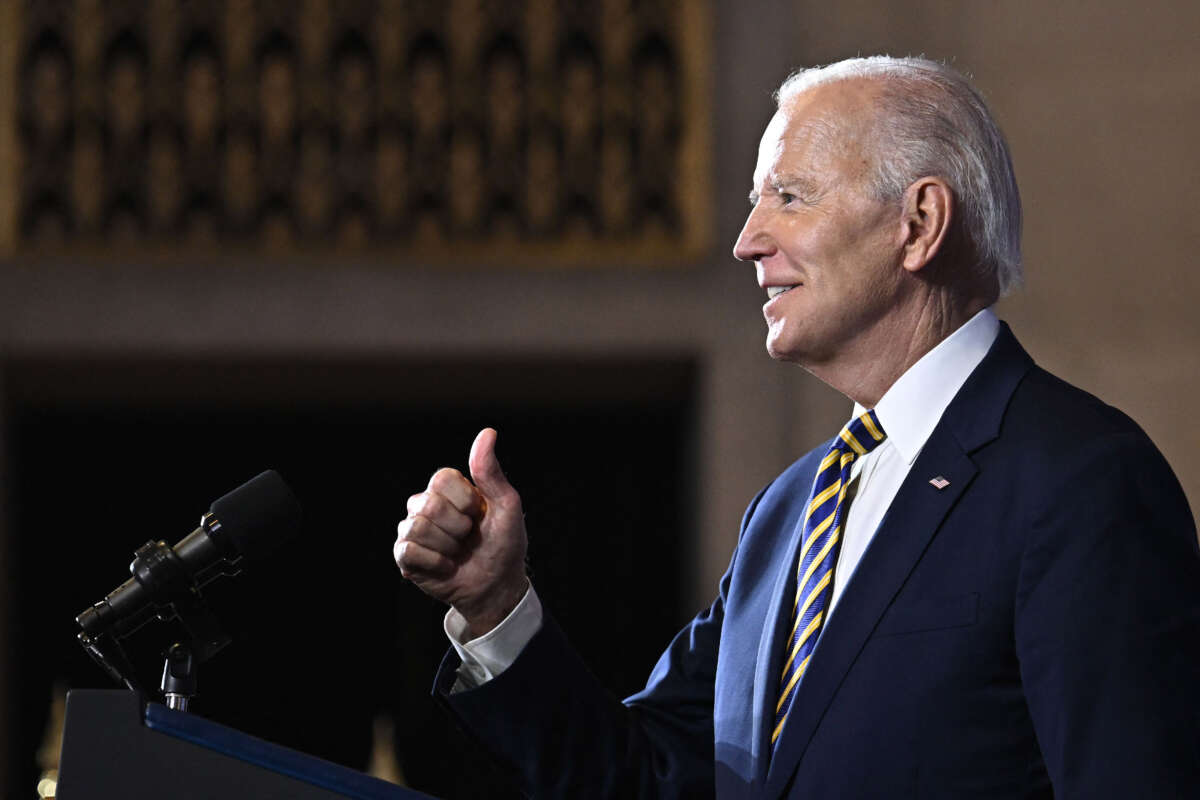Did you know that Truthout is a nonprofit and independently funded by readers like you? If you value what we do, please support our work with a donation.
President Joe Biden signed the Respect for Marriage Act into law on Tuesday — a little more than 10 years after he first announced his support for marriage equality as former President Barack Obama’s vice president in 2012.
On social media earlier in the day, Biden had celebrated his plans to sign the legislation, which will enact federal protections for LGBTQ couples who are seeking to marry or who have already married since the landmark 2015 Supreme Court ruling Obergefell v. Hodges, which established marriage equality across the U.S.
“Today, I sign the Respect for Marriage Act into law — a landmark civil rights bill that honors the courage and sacrifice of generations of couples who fought for marriage equality and equal rights,” Biden wrote in a Facebook post on Tuesday morning.
“If there is one message that breaks through from today, it’s that this law — and the love it defends — strikes a blow against hate in all its forms,” Biden added in a Twitter post.
Biden had also previously pointed out that the bill is just “one step” on a “long journey to build a more perfect union.”
“We must never stop fighting for full equality for LGBTQI+ Americans and all Americans,” Biden said in a statement last week.
Biden’s views on marriage equality have shifted over the past two decades. In 2005, just 37 percent of the U.S. population believed that same-sex couples should have the legal right to marry, according to polling from Gallup. In 2022 — just 17 years later — 71 percent back marriage equality.
In the 1990s, Biden voted in favor of homophobic legislation, including the Defense of Marriage Act, which barred federal recognition of same-sex couples’ marriages, even in states where such marriages were allowed. (That law was later ruled unconstitutional by the Obergefell decision.)
In 2008, as a candidate for vice president, Biden said he didn’t believe that same-sex couples should be granted the right to get married.
“No. Barack Obama nor I support redefining from a civil side what constitutes marriage,” Biden said in an interview that year.
Four years later, during an interview on NBC’s “Meet the Press” program in May of 2012, Biden described himself as being in full support of marriage equality, saying:
I am absolutely comfortable with the fact that men marrying men, women marrying women, and heterosexual men and women marrying another are entitled to the same exact rights, all the civil rights, all the civil liberties.
The comments came as he and then-President Barack Obama were seeking reelection, just six months before Election Day. A few days after Biden’s interview, Obama announced that he also backed same-sex marriage protections.
Three years after Biden and Obama won reelection, the Supreme Court solidified marriage equality as the law of the land.
Some lawmakers and advocates believe that court ruling could be endangered, however.
In a Supreme Court ruling earlier this year that upended federal recognition of abortion rights, Justice Clarence Thomas wrote a concurring opinion in which he said cases based on the right to privacy — which include Obergefell — should be reexamined by the Court.
In response to this statement, a bipartisan group of lawmakers, led by Sen. Tammy Baldwin (D-Wisconsin), the first open lesbian in the U.S. Senate’s history, drafted the Respect for Marriage Act. After attaching an amendment assuring conservatives that the bill wouldn’t rescind rights for those with religious objections to same-sex marriage, the bill passed in both chambers of Congress, and was sent to Biden’s desk late last week.
Many advocates — and Biden himself — have noted that marriage equality is only one step in achieving LGBTQ liberation. Indeed, LGBTQ people in the U.S. still face restrictions when adopting children, and experience higher rates of poverty, incarceration, suicidal ideation and targeted violence. In recent years, far right lawmakers have executed a coordinated campaign to portray gay and trans people as “groomers,” a baseless and demeaning narrative that has resulted in the passage of anti-LGBTQ legislation in statehouses across the country. This rhetoric has also led to violent threats and intimidation against LGBTQ people.
LGBTQ groups are celebrating the signing of the Respect for Marriage Act while also recognizing that many challenges persist.
“The #RMA moves us one step closer to on our journey to achieving full liberation for all LGBTQ+ people,” Equality Virginia tweeted on Tuesday.
Media that fights fascism
Truthout is funded almost entirely by readers — that’s why we can speak truth to power and cut against the mainstream narrative. But independent journalists at Truthout face mounting political repression under Trump.
We rely on your support to survive McCarthyist censorship. Please make a tax-deductible one-time or monthly donation.
